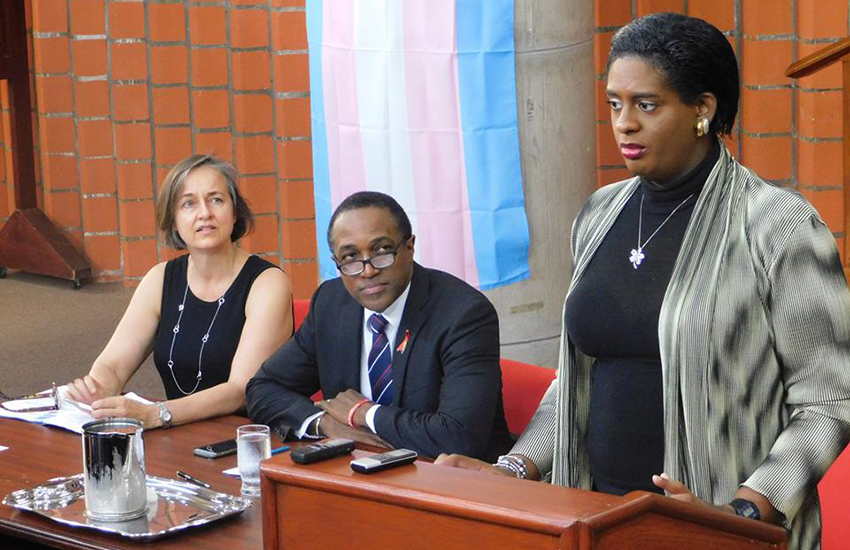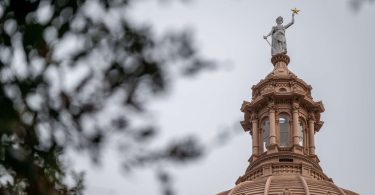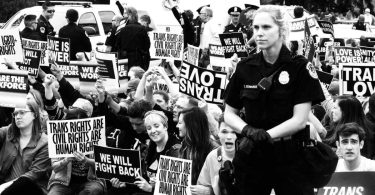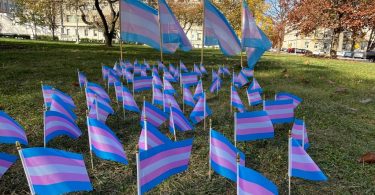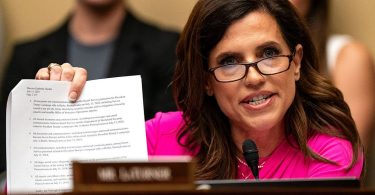This month (6 June) I stood at a podium in Barbados to announce the first legal challenge to the worst anti-sodomy law in the western hemisphere.
Barbadian law still punishes homosexuality with life imprisonment.
As a trans woman this law contributes to my victimization. I and other LGBTI people experience violent attacks and vulgar name calling, some of which police participate in.
Two other Barbadians, a lesbian and a gay man, also joined me in filing this case – but for safety’s sake they opted to remain anonymous.
I cannot blame them. Malicious anti-LGBTI forces, supported by American right-wing religious extremists, have recently been on the rise in Barbados. Unsurprisingly, their actions have increased the threat level for people like us.
I experienced a particularly savage attack in February. My attacker nearly killed me but the police treated it lightly because, as one officer told me, ‘they don’t want to deal with people like you’.
After that, I felt that I had no choice but to take a stand. Simply put, my life depends on ending this law.
We’re taking the Barbados sodomy law to court
So we filed a petition before the Inter-American Commission on Human Rights (IACHR). It challenges sections 9 and 12 of Barbados’ Sexual Offences Act. We are making our case with the support of our pro-bono counsel from the Canadian HIV/AIDS Legal Network and the International Human Rights Program at the University of Toronto Faculty of Law.
These laws criminalise any form of sex that does not have the possibility of creating children. For a tiny overpopulated island this should be the least of our worries.
On their face, the laws look gender-neutral. However, lawmakers initially drafted them to stop gay sex.
Local, regional and international bodies have repeatedly asked Barbados to scrap these useless, invasive and dangerous statutes. In particular, they’ve argued that the Barbadian legislation drives up HIV infections.
Despite this, the Barbadian government has stubbornly refused to act. Politicians claim they do not have a mandate to legalize same-sex intimacy.
Such was the level of homophobia at the time the law was written, the legislation initially made no distinction between consensual gay sex and sexually abusing an animal. Nowadays, the law does distinguish between the two. But society still views LGBTI people, particularly men who have sex with men (MSM) and some trans women, in the same perverse light.
Every time I am in the arms of a man, the law is in the back of our minds
As a trans woman, the law, coupled with society’s belief of who I am, has many implications.
I have never hidden the fact that I was assigned male at birth. As such, I have transitioned to live my life as a woman, and am sexually active with men.
I have exclusively sought and enjoyed intimacy with men. In turn, those men have also sought and enjoyed my company as a woman, whether they gave regard to the fact that I once grew up as the opposite gender or they simply saw me as a woman through and through, in spite of my body.
However, every time I am in the arms of a man and we enjoy our moments of passion, the law is in the back of our minds. We cannot allow anyone to know we are together, we cannot allow anyone to see or hear us.
If law enforcement became aware of our trysts, the results would be serious. They would charge us and haul us before the courts. My body would be used as evidence against us.
Moreover, the public would witnesses it all. What was intended to be a tender, private moment would be turned into a disgusting crime committed by deviant, twisted criminals.
Worse yet, the courts are able to end our lives as we know them by sentencing us to up to a lifetime in prison. Of course, that is if we went all the way. Had we settled for something less physically involving, yet still sexual in nature, we face 10 years on a charge of Serious Indecency.
The law forces us into secrecy
Every time I and a sexual partner enjoy each other’s intimate company, we know we are committing a crime. Each time we end our romantic encounters and get on with our day, we are basically criminals at large.
Even confiding in close friends or even health care professionals about what we did is essentially a confession. It can used against us, as we are recklessly admitting to an odious offence under the law.
To society, I am not worthy to live my life as a free woman
This private side of my life makes me persona non grata as I walk the streets.
Society may not know what I get up to behind closed doors. But their assumption is enough. To them, I am not worthy of the right to live my life as I see fit.
Most Barbadians believe society and religion have the right to dictate every personal moment in my life. I am not to pursue a relationship with a man, I am not to seek intimacy with him, I am not even to admire him as he walks past.
Yet, society tells non trans women and heterosexual men to go for it. They are to pursue their potential partner’s affections, to enjoy every lasting moment of intimacy, to build their lives together.
They are even encouraged to have sex in the way the law says is wrong. But they rest assured that the law will not touch them, because what they are doing is ‘normal’ and ‘natural’, because they were born as male and female and have remained that way, unlike myself.
It is our fault for being who we are
Society punishes me at every turn for my innate feelings, simply it does not view me as ‘normal and natural’.
As a result, whenever malice befalls one of us in the LGBTI community, it is often dismissed as being our just desserts for living lives of perversion and immorality.
Society’s view is our aggressors are somehow justified because the way we live our lives is inflammatory. Therefore, it’s no wonder that people may become abusive and violent. It is our fault for being who we are.
What is more, every time we come together to advocate for change, these laws are an immovable roadblock. For many, these laws justify how we are treated. They are means of keeping us under control, because we are a threat to society.
Of course, the law clearly condemns abuse and violence. However, the police often fail to investigate crimes against us or bring those guilty to justice. After all, the law was not on our side from the beginning.
I learned that for myself in February of this year, after I experienced that savage attack.
This petition is, for me, the difference between life and death
That’s why this petition was so necessary, not just for me as a trans woman, but for the wider LGBTI community.
For me, this is about being able to go about my daily life without anxiety or a bout of depression because of how society treats me. It’s about ending the legal right for my neighbors to see me as a vile creature who doesn’t deserve to live.
This petition is, for me, the difference between life and death.
Simply, we need to be free to advocate across the board to protect and preserve the LGBTI community from violence. If we can’t, we can be picked off with impunity, one by one.
I am happy to say that, after having suffered through this type of fear, anxiety, abuse and mistreatment for much of my nearly 25 years on this earth, that I was able to take a stand on 6 June 2018.
Now, with the help of friends and colleagues, our petition is going to the IACHR. It’s a first step in putting a stop to the stigma and discrimination against lesbian, gay bi, trans and more people in Barbados. And it will help us to survive and thrive in this country we call home.
Gay Star News is a media partner of Barbados Pride.

